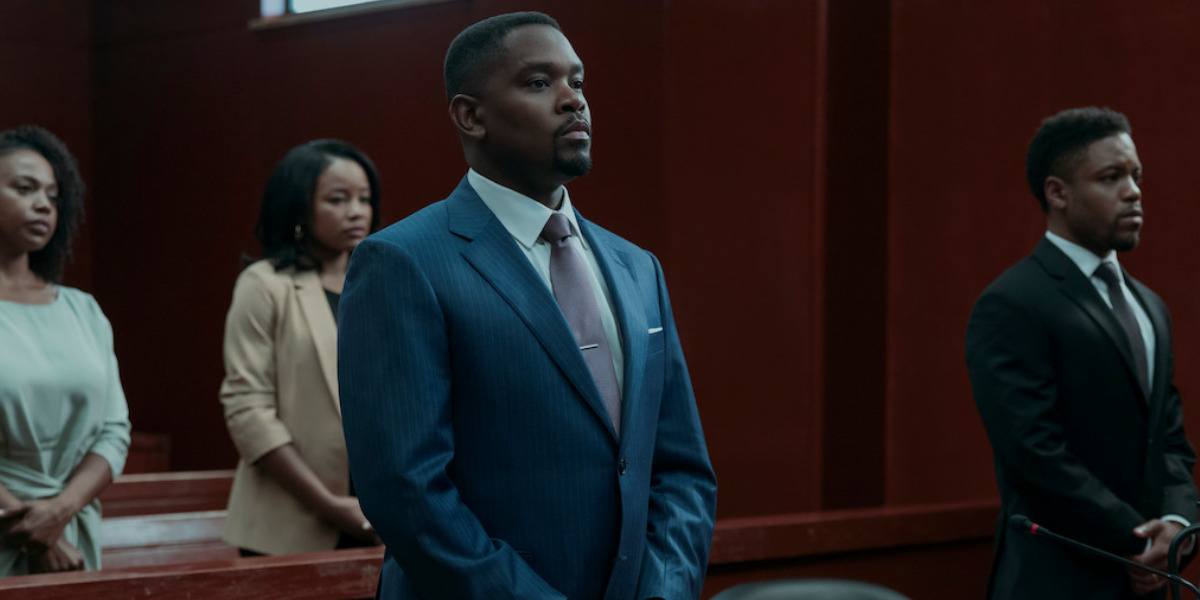In the Netflix drama show, ‘A Man in Full,’ Charlie Croker helms the narrative as the lead protagonist, with his financial misadventures setting up the premise for the tale. Even so, Roger White, Croker Industries’ trusted lawyer, remains a similarly permanent fixture within the show, with his character influencing numerous storylines. From Charlie’s conflict with the gleeful bankers at PlannersBanc to Conrad Hensley’s striking struggle with the justice system, Roger retains relevance in almost every corner of the various narratives in the show. For the same reason, the attorney at law must turn some heads, invoking viewers’ curiosity regarding his potential relationship with any real-life individual.
Roger White: A Modernized Take On Tom Wolfe’s 1998 Character
Aml Ameen’s character, Roger White from ‘A Man in Full’ finds his origin in the show’s source material, the eponymous Tom Wolfe novel published in 1998. In the latter work, Wolfe introduces White’s character into his fictional narrative to explore the racial themes within the story. As a result, in the book, the lawyer’s storyline interweaves with that of Fareek “The Cannon” Fanon, a star athlete embroiled in allegations of sexual assault. The storyline, distinct from the novel’s unraveling of Charlie Croker and his financial crisis, adds another layer to the narrative. Furthermore, it highlights the racial tension across Atlanta as they pertained to the late 1990s.

Reportedly, Wolfe’s research in setting his story in Atlanta paved the path for Roger White’s character and storyline inception. While Atlanta may have been a new ballpark for the author, analysis of racial conflict was a thematic path Wolfe had trodden before and since in his 1987 novel, ‘The Bonfire of the Vanities’ and 2012 work, ‘Back to Blood’ respectively. Consequently, his exploration of the same general theme in ‘A Man in Full’ under a different context through Roger White’s character retained social relevance. Thus, despite lacking a clear real-life counterpart, Roger White’s character enhanced the book’s sense of realism.
Similarly, the 2024 adaptation of the novel through Netflix’s identically titled series employs Roger for much the same purpose, infusing his character with socially relevant storylines. In the show, Roger acts as Charlie’s favored attorney, who goes head-to-head against the bankers at PlannersBanc. However, a more significant aspect of his character remains his involvement with Conrad Hensley— one of the storylines where the show departs from the source material in notable ways.
After a series of unfortunate events, Conrad ends up getting arrested and charged with the assault of a police officer after he resists the cop’s initiated aggression. As a result, his wife, Jill, who is Charlie’s executive assistant, manages to secure the legal counsel of the businessman’s best lawyer. As such, together, the three characters— Conrad, Jill, and Roger— chart a nuanced and socially relevant storyline revolving around racial bias in the judicial and prison systems. Therefore, the show presents a significantly modified— yet equally realistic and influential narrative for Roger’s character, drawing on real-life racial issues.
The relationship between the real-life prevalence of wrongful convictions and racial bias has been a long-studied area of the country’s judicial system across different activist circles. According to estimations, 4-6% of incarcerated individuals in the country are innocent. The same estimation, paired with the statistics that establish the prison population’s 40% makeup of Black Americans, despite their overall contribution of only 13% in the country’s population, creates an inherent racial imbalance within the numbers.
As a result, Roger’s modified storyline in the show, which shines a light on the relationship between race and the judicial system, offers a highly socially relevant perspective to the overall narrative. In that regard, although on-screen Roger White diverges from his bookish counterparts, he retains a similar sense of realism. Even so, ultimately, outside of the social commentary presented by the character, Roger White holds no connections to a real-life individual.
Read More: Best Lawyer and Courtroom Movies on Netflix


You must be logged in to post a comment.